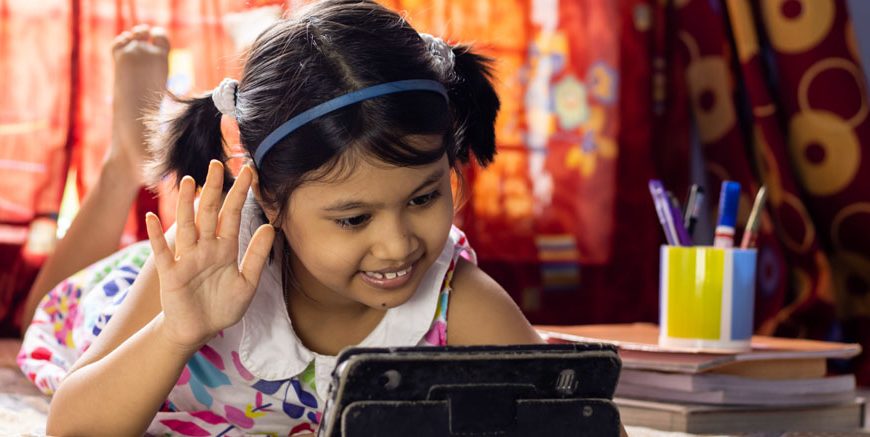Picture this: It’s a quiet afternoon, and your little one is glued to a tablet, giggling at animated characters or tapping away at colourful games. While it’s heartwarming to see them entertained, have you ever paused to wonder what all those hours of screen time might be doing to their growing minds and bodies?
Studies show that screen time among young children (age 2 or less) is rising. As parents, it’s important to take active steps to introduce your little one’s outdoor activities and creative explorations before they head on to preschool. In this article, we will discuss how to reduce heightened screen time levels in young kids. But before that, let’s understand the impact of screen time on kids and more.
How Has Screen Time Changed Over the Years?
Remember when the screen time battle was limited to Saturday morning cartoons? These days, screen time isn’t just about watching TV or video. Kids are engaged in a whole universe of devices– there are phones, tablets, laptops, and more.
A study shows that only 35% of preschoolers between the ages of 2 and 6 adhere to the screen time guidelines of less than one hour a day. This means that the majority of kids are spending more time on devices. The study also points out a few reasons for increasing screen time.
- TV left on at home
- Electronic device in child’s bedroom
- Higher parental screen time and others
It’s a tough situation, but you can address it, and we will help you. Later in the article, we will share some practical tips to help reduce screen time for your kids. Stick around!
Screen Time Recommendations by Age
Before we discuss the impact of excessive screen time on kids and corrective measures, let’s examine the screen time recommendations by age. Organisations like the American Academy of Pediatrics (AAP) and the Centers for Disease Control and Prevention (CDC) make these recommendations.
- Infants (under 18 months): No screen time for kids of this age.
- 18 to 24 months: Parents should only allow high-quality educational content for kids of this age group.
- Ages 2 to 5 years: No more than one hour of screen time per day with parental supervision.
- Ages 5 and older: No more than two hours daily, ensuring a balance with other activities like exercise and social interaction.
- Preteens and teenagers: Screen time should be managed to support mental health, academic success, and social well-being, prioritising physical activity and offline engagement.
To promote healthier habits, experts recommend replacing excessive screen time with activities like outdoor play, biking, yard work, dancing, or walking a pet.
Effects of Excessive Screen Time on Your Child’s Language Skills
Excessive screen exposure, that is, two or more hours daily, is believed to increase the risk of language delays in toddlers between 12 and 24 months. That is why organisations like the AAP and CDC advise parents to keep devices at bay during this time.
However, not all screen time can affect your little one’s language skills. For instance, interactive language or vocabulary games can have educational benefits and help your children learn more. However, parental supervision remains crucial in all cases.
Effects of Excessive Screen Time on a Child’s Development
Parents always worry about their child’s physical, mental, and social development. Excessive screen time is believed to alter child development. While high-quality educational content can aid learning, mindless scrolling on devices or watching television for long hours has been linked to language delays, reduced social skills, and behavioural issues. Moreover, prolonged exposure to digital devices also contributes to obesity, poor sleep, and, in some cases, eye strain.
When is Screen Time Beneficial for Kids?
Educational programming can offer benefits to kids. For the unversed, educational programming refers to content designed to educate and inform kids. The main aim of educational programming is to enhance your little one’s knowledge, skills, and critical thinking.
Children watching age-appropriate educational content can better recognise numbers, letters, colours, and shapes.
A Better Alternative to Reduce Screen Time
Parents can engage their kids in outdoor and indoor activities like swimming, walking, running, etc. You can also look for structured learning programs that ensure holistic development and prepare your kids for school. For instance, many preschools offer toddler transition programs. These programs provide a safe and engaging environment where children can thrive without the distractions of screens. With child-friendly infrastructure and expert care, toddlers are encouraged to participate in activities that stimulate their minds and bodies. Parents looking to reduce screen time can integrate structured programs like EuroKids’ Toddler Transition Program into their child’s daily routine. By replacing passive screen exposure with engaging activities, children can develop essential skills while enjoying a sense of accomplishment.
Parental Supervision and Screen Time
Enrolling in a toddler transition program or getting your kid into a hobby class alone cannot reduce screen time. While these activities will limit screen time, managing screen time isn’t just about limiting usage. It’s about engaging them in more fun and interesting activities than checking digital devices. As parents, you must take the first step in spending time with your kids. You can plan many activities with them that keep them entertained and excited. If you are looking for fun ways to engage your little one, check out our blog, What Are Some Fun And Educational Activities For Preschoolers At Home?
You can also check out EuroKids Blogs for more information on your child’s health, development, and learning. And don’t forget to check out EuroKids Preschools for the first step in your child’s learning journey!














